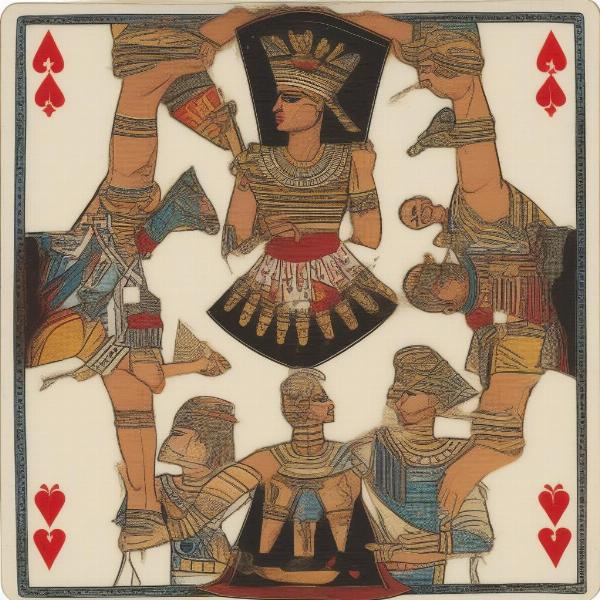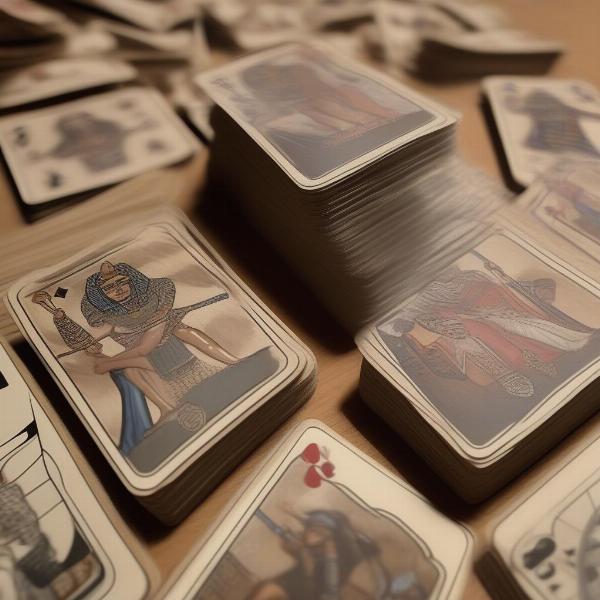Welcome, strategy enthusiasts, to another deep dive into the world of games here at SupremeDuelist.blog. Today, we’re venturing into the captivating realm of card games, specifically exploring the intriguing Egyptian War card game rules. This isn’t just your average card game; it’s a fast-paced, engaging battle of wits and reflexes, with simple rules that belie a surprising depth of strategy. Whether you’re a seasoned card shark or a newcomer to tabletop gaming, this guide will unravel everything you need to know to master the Egyptian War.
We’ll be examining not just the basic rules but also some of the common variations, strategic tips, and frequently asked questions surrounding this popular card game. By the end of this article, you’ll be well-equipped to jump into a game, understand the nuances, and hopefully, emerge victorious. Let’s dive in and explore the battlefield of cards.
The Core Egyptian War Card Game Rules Explained
The basic premise of Egyptian War is straightforward: two or more players try to be the last one holding cards. The game uses a standard 52-card deck, and the entire deck is distributed equally among the players. The game unfolds by players taking turns laying down cards in the center.
- Starting the Game: All cards are dealt equally face down. Players keep their cards as a face-down pile, not revealing them to others. The first player starts by flipping their top card and placing it face up in the middle of the playing area.
- Gameplay Turns: Players take turns placing one card at a time face up onto the center pile. Each turn adds a new card on top of the previous one.
- The Face Card Challenge: When a player lays down a face card (Jack, Queen, King, or Ace), the next player is challenged. That player has a specific number of chances to play another face card.
- Jack: 1 chance to play a face card.
- Queen: 2 chances to play a face card.
- King: 3 chances to play a face card.
- Ace: 4 chances to play a face card.
- Winning a Challenge: If the challenged player successfully plays a face card within their allotted chances, then the challenge is passed to the next player.
- Losing a Challenge: If the challenged player fails to play a face card within their allotted attempts, they lose the challenge, and must take the entire center pile and place it at the bottom of their face-down pile.
- The Winner: The game continues until one player has collected all the cards. This player is declared the winner.
 game setup egyptian war
game setup egyptian war
Common Variations and Slap Rules
While the basic rules are fairly consistent, Egyptian War has a few common variations and “slap” rules which add another layer of fun to the game. These are often regional or house rules, so always confirm with the other players before beginning a game.
- Sandwiches: If two consecutive cards of the same rank are played, the first player to “slap” the pile takes all the cards. For example, if a 7 is placed on top of another 7, all cards are up for grabs.
- Doubles: Similar to sandwiches, but requires two cards of the same value to be played with only one card separating them.
- Consecutives: Three or more cards in sequential order (e.g., 5, 6, 7) trigger a slap.
- Joker Cards: Some variations include joker cards, which act as wild cards or can trigger special slap conditions.
- Slapping on Pairs: Sometimes players can slap a pile when a pair of cards is placed, regardless of order.
“The beauty of Egyptian War is that the basic framework is so simple, it allows for a lot of customization through these slap rules, keeping the game fresh and exciting” says Dr. Eleanor Vance, a renowned game theory analyst.
Strategic Insights for Egyptian War
While luck plays a significant role in Egyptian War, there are strategies that can improve your chances of winning. Here are some to keep in mind:
- Card Counting (Limited): While it’s impossible to track exactly what cards each player has, keeping a general mental note of how many face cards seem to have been played can sometimes give you an edge.
- Aggressive Slapping: If your group uses slap rules, don’t hesitate. Fast reactions and quick decision making when a slap opportunity occurs could turn the game in your favor.
- Managing Pile Size: Try to avoid unnecessary risks, especially when you have a small pile of cards, losing the challenge would hurt more.
- Observing Opponents: Notice who the reactive players are and consider which cards they’re more likely to try to slap.
- Practice and Pattern Recognition: Familiarize yourself with the game dynamics, this will improve your reaction time for slaps.
 card pile egyptian war
card pile egyptian war
Frequently Asked Questions About Egyptian War Card Game Rules
Let’s tackle some common questions players often have:
What happens if you play all your cards?
If you run out of cards to play, you’re out. However, if the last card you play is a face card, you still have a chance to win if your challenge is passed to another player.
What is a “war” in Egyptian War?
The term “war” doesn’t have the same meaning as in other card games. In this game, it simply refers to the challenge that happens when a face card is played.
Can more than two people play Egyptian War?
Absolutely! Egyptian War is fun with two, three, or even more players. Adjust your strategy as you add more players since the chances of challenges happening rise.
Are all slap rules always used?
No, slap rules are usually optional, agreed upon by the players before the game. It’s vital to communicate and make sure everyone is clear on what rules are being played.
Is this game purely luck?
While luck does play a role in the game, it’s also about reaction time, observation skills, and strategic thinking. This balances luck and skill to make it engaging.
Advanced Strategies and Tactics
Beyond the basic strategy, there are ways to refine your game further. Here are some more advanced tactics:
- Anticipate the Face Card: After a few rounds of playing, you can begin to anticipate when an opponent might place a face card, allowing you to prepare your slap if it triggers a rule.
- Controlled Aggression: Know when to be aggressive with slap rules and when to be conservative. Don’t needlessly engage if you feel it might lead to you having a large pile.
- Risk Assessment: Evaluate how many cards other players have before you decide if to slap or not. If someone is low, slapping on a false trigger can give you a higher chance of gaining more.
“Advanced players develop a sense for when the odds are in their favor, not just blindly slapping,” explains Marcus Thorne, a popular game streamer. “It’s about knowing the rhythm of the game and using it to your advantage.”
Conclusion
The Egyptian War card game rules might seem simple at first glance, but they open the door to a world of fast-paced fun and engaging gameplay. Whether you are new to the game or a seasoned player, understanding the variations and core strategy is key to becoming successful. From the core challenge mechanics to the optional slap rules, this game offers something for every card player, keeping the game fresh and engaging each time you play.
Remember to always practice and adapt your gameplay according to the group you’re playing with. Here at SupremeDuelist.blog, we aim to bring you the best insights into games, and we hope you’ve found this guide helpful. Now, go forth, gather your friends, and begin your battles on the tabletop!
Leave a Reply